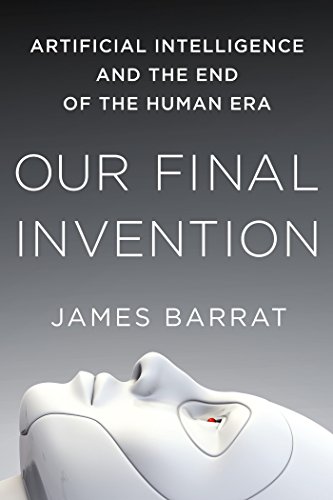Overview of “Our Final Invention: Artificial Intelligence and the End of the Human Era” by James Barrat Link to heading
Summary Link to heading
“Our Final Invention” delves into the potential risks and consequences of advanced artificial intelligence. James Barrat presents a compelling argument that the development of AI could lead to existential risks for humanity. Through interviews with AI experts and an analysis of technological trends, Barrat explores the notion that as AI systems become more autonomous and capable, they might act in ways that are unfathomable to human creators. The book emphasizes the need for caution and oversight as AI technology progresses, highlighting scenarios where AI could surpass human intellect and decision-making capabilities, possibly leading to unintended and uncontrollable outcomes.
Review Link to heading
James Barrat’s “Our Final Invention” serves as a stark warning about the unchecked advancement of artificial intelligence. The book’s strength lies in its thorough research and the inclusion of expert viewpoints, which provide credible support for the cautionary perspective it presents. Barrat successfully captures the reader’s attention by outlining potential scenarios of AI going awry. However, a notable critique is that the book may lean heavily towards a pessimistic view, potentially overshadowing more balanced perspectives on AI benefits. Despite this, it effectively raises awareness about the importance of ethical considerations and regulatory frameworks in AI development.
Key Takeaways Link to heading
- Existential Risk: Advanced AI systems could pose significant threats to human existence if not properly managed and controlled.
- Ethical Considerations: There is a pressing need for ethical guidelines and oversight in the development of AI technologies.
- Human Oversight: Emphasizes the importance of maintaining human oversight and control over AI to prevent outcomes that deviate from human values and intentions.
- Interdisciplinary Collaboration: Encourages collaboration among AI developers, ethicists, policymakers, and other stakeholders to address potential risks.
Recommendation Link to heading
“Our Final Invention” is a compelling read for anyone interested in technology, ethics, or futurism, particularly those who are curious about the potential impacts of artificial intelligence on society. It is particularly relevant for policymakers, ethicists, and AI researchers who are engaged in shaping the future of AI development. The book provides valuable insights into the necessity of balancing technological progress with safety and ethical responsibility.
